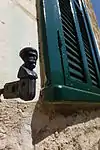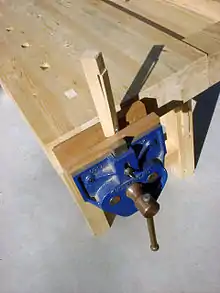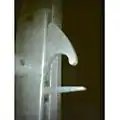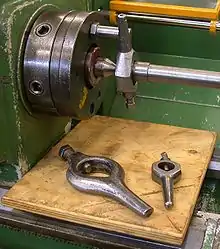Dog (engineering)
In engineering, a dog is a tool or part of a tool that prevents movement or imparts movement by offering physical obstruction or engagement of some kind. It may hold another object in place by blocking it, clamping it, or otherwise obstructing its movement. Or it may couple various parts together so that they move in unison – the primary example of this being a flexible drive to mate two shafts in order to transmit torque. Some devices use dog clutches to lock together two spinning components. In a manual transmission, the dog clutches, or "dogs" lock the selected gear to the shaft it rotates on. Unless the dog is engaged, the gear will simply freewheel on the shaft.
This word usage is a metaphor derived from the idea of a dog (animal) biting and holding on, the "dog" name derived from the basic idea of how a dog jaw locks on, by the movement of the jaw, or by the presence of many teeth. In engineering the "dog" device has some special engineering work when making it – it is not a simple part to make as it is not a simple bar or pipe, and the metal used in its construction is likely to be special rather than regular steel.
There is potential for confusion as "dog tensioners" are levers that are named due to the shape of the lever appearing as a dog leg, as the lever is in a pantograph arrangement, or "dog trailers", which are named due to the use of multiple trailers for transporting animal cages.
Subtypes and examples of applications
Chainsaw dog
Although not seen on all chainsaws, when present chainsaw dogs are mounted where the bar meets the power head. Chainsaw dogs provide stability and serve as a sort of fulcrum for swinging the bar through the item being cut.

Shutter dog
Functional exterior window shutters (which can be swung shut whenever storms approach in order to protect the window glass from impact by wind-blown debris) are held open during pleasant weather by wrought-iron or cast-iron dogs, which are called shutter dogs.
Bench dog
A bench dog is an accessory used on a woodworking workbench to allow clamping of wooden items whilst being worked.
Ladder dog
Ladder dogs are the parts of a ladder that hold the ladder at a certain height, and articulate against pawls to allow adjustment.
Door dog
_raise_an_external_hatch_to_perform_maintenance_on_the_watertight_gasket_and_moving_parts.jpg.webp)
The doors that allow passage through bulkheads between compartments inside a ship can be closed during emergencies to seal off one compartment from another, thus isolating flooding, smoke and heat from adjoining compartments. The objects that are wedged against the door to hold it closed are dogs. To dog the doors means to close the doors and secure them in the closed positions. Similarly, hatches are the horizontal openings between decks, and are secured with hatch dogs.
Firedog (alias dog iron, andiron)
Andirons, which hold up the firewood in a fireplace, are sometimes called dogs, firedogs, or dog irons.
Clutch dog
The clutch that mates the engine to the transmission in a modern manual-shift automobile is a friction clutch whose disc and pressure plate are smooth; they lock up simply through friction. However, some kinds of clutches (including those inside an automatic transmission) may lock up via the engagement of dogs, rather than only through friction. These clutches are called dog clutches and the dogs used within them are called clutch dogs.
Lathe dog
The lathe dog (or lathe carrier) is essentially analogous to a clutch dog. It is used to provide positive drive to a workpiece turning between centers on a lathe. Without the dog, the cutting tool would tend to "catch", e.g., stop the workpiece from turning while the headstock center continued to rotate, possibly causing damage to the workpiece, or the lathe.
Feed dog
The feed dogs of a sewing machine feed the fabric in a linear stepping motion past the needle.
Log dog or timber dog
In carpentry log dogs were used to repair timber frame joints. In hewing (shaping with an axe) timbers or sawing with some types of water powered sawmills log dogs are used to hold the timber in place.
Drive dog or reel dog
In film projection, reel arms and film rewinds employ drive pins adjacent to the spindle shaft, which are used to drive the reel as the spindle rotates. These are referred to as drive dogs or reel dogs.
Images
 A wooden bench dog with a hickory spring clamped in a vise. Note also the steel dog that is integral to the vise
A wooden bench dog with a hickory spring clamped in a vise. Note also the steel dog that is integral to the vise A ladder dog
A ladder dog Hatch dogs around a door on the R/V Knorr
Hatch dogs around a door on the R/V Knorr Straight-leg lathe dogs (carriers)
Straight-leg lathe dogs (carriers) Log dogs are used to hold timbers in place while hewing or as a repair to timber frame joints.
Log dogs are used to hold timbers in place while hewing or as a repair to timber frame joints.